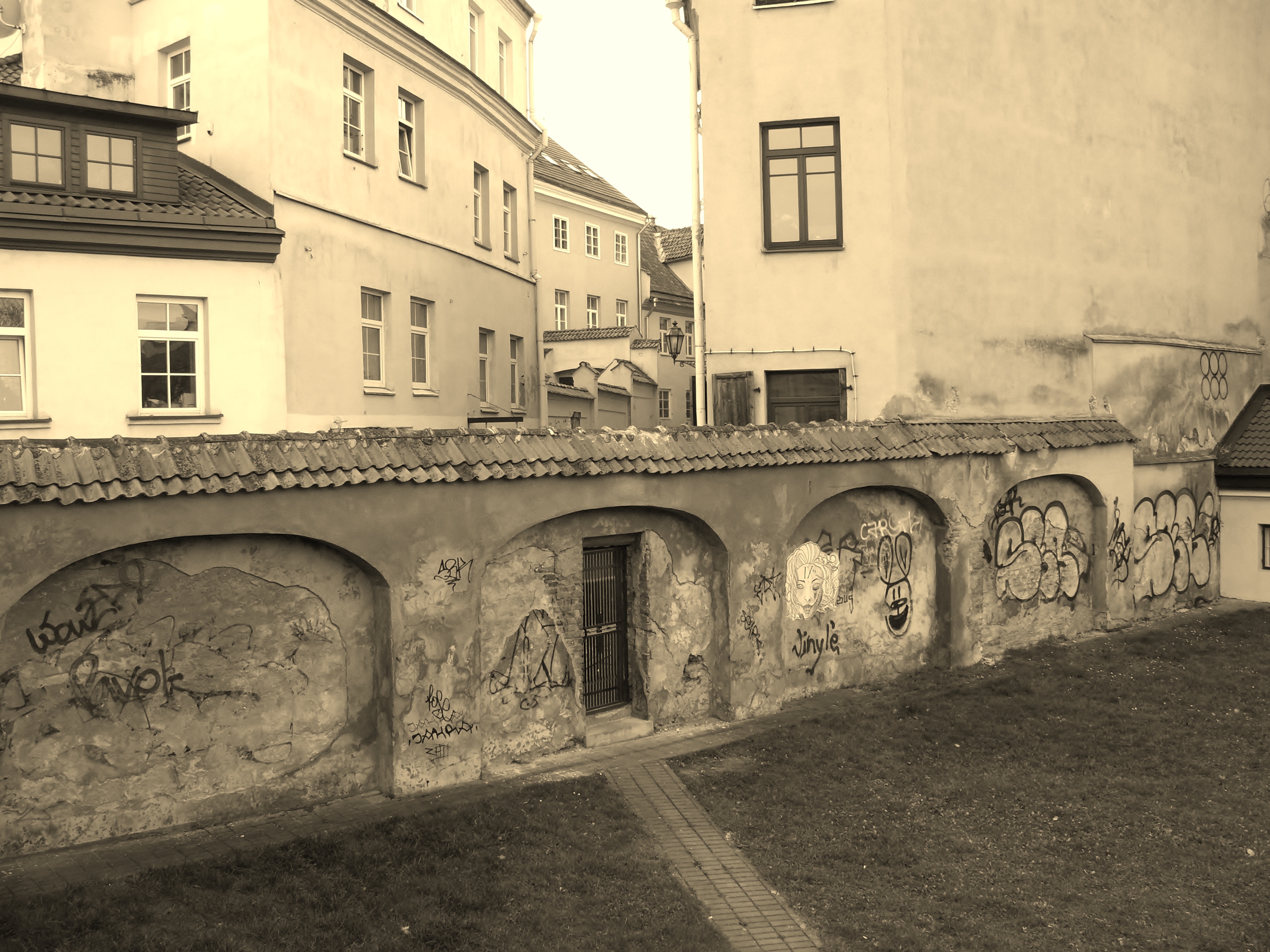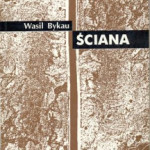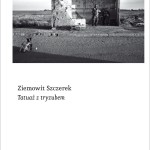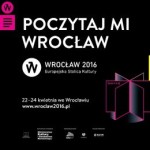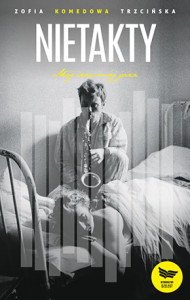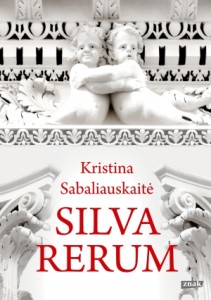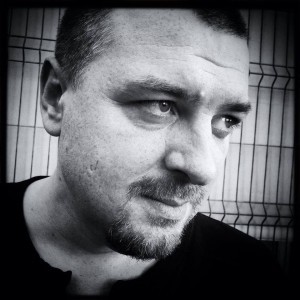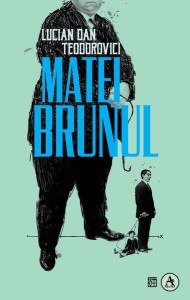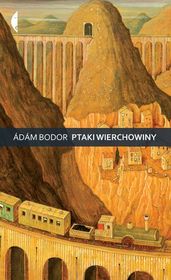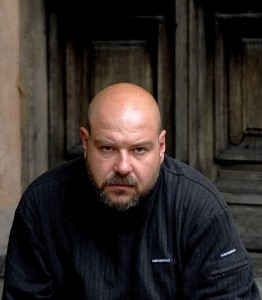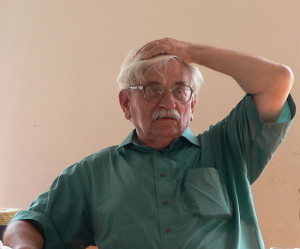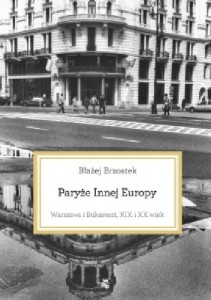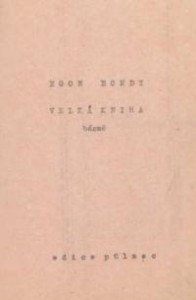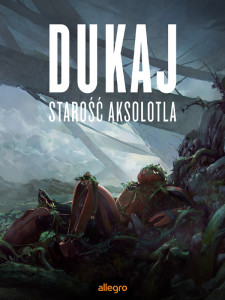THE WALL FORGOTTEN
Piotr Kępiński writes about works of a remarkable but forgotten writer, Vasil Bykov (died in 2003).
Have you seen The Ascent directed by Larisa Shepitko? It was an excellent film starring Anatoli Solonitsyn? A peculiar psychodrama, philosophical tale where metaphysics ruled over realism? After I saw the film, I thought that the Russians had an ability to speak about war in a truly moving way, they know how to evoke strong feelings. Back then, I did not know that Shepitko’s film was based on a short story by Vasil Bykov, the most remarkable Belarusian writer.
There was a time when Bykov was recognised as a writer in Poland. His short stories were regularly published. He was not a well-known writer, but reviewers and critics of soviet literature noticed his works. Bykov was writing all the time – effects of his ceaseless work were clearly visible as he became a master of short forms. He developed his own style and poetics which on the one hand make the readers think of elusiveness and gentleness and on the other remind of an enormous strength of classical realism. This combination resulted in many brilliant short stories like Sotnikov which served as a basis for The Ascent.
Bykov was born in 1924 in a village close to Viciebsk. He died in Minsk in 2003. During the WWII, he fought in Ukraine, Romania, Hungary, and Austria. He served on the front line as lieutenant. He often wrote about these experiences. His works like The Dead Feel No Pain, To Live till Sunrise, or His Battalion are true masterpieces of literature. Bykov also wrote short stories which described the occupied Belarus − Kruglyansky Bridge or To Go and not Return are examples of short stories from the guerrilla series. His last works challenge the Stalinist period. The writer also strongly emphasised his ethnicity.
The Wall, brilliantly translated into Polish by Jan Maksymiuk and Czesław Seniuch, is a collection of short stories, which was published 16 years ago and awakened a considerable interest from Polish critics.
This interest should not surprise anyone as these stories are outstanding. It was the first work by Bykov published in Poland in the last 10 years. None of the Belarusian publishing houses wanted to print the next edition of this collection and finally, after the readers donated the money, it was published by independent newspaper Nasha Niva.
Back then, Bykov lived in Germany. No one could tell if he planned to go back to Minsk: his visa was about to expire. Earlier, for a year and a half he was staying in Helsinki, invited by the Finnish PEN Club. In January 1999 he returned to Belarus for a short time, he also went to Moscow where he was presented with the Triumph Award (awarded annually to honour outstanding contributors to Russian culture; the award was founded by Boris Berezovsky who died 3 years ago). Bykov thought that Minsk was not appropriate for writing – its atmosphere was unfavourable both in terms of politics and climate. Still, few months later he returned to his motherland.
The stories from The Wall reminded me of Interrogation directed by Ryszard Bugajski. The tragedy that the imprisoned had to face, informing against others, monotony of crime are the things these two works have in common. In general, one could say that Bykov had a filmic way of writing – he was sensitive to colours, had absolute pitch, and his skilfulness in creating metaphors could embarrass quite a large number of Nobelists. Each sentence written by Bykov hides a true tragedy, readers can sense that in many of his short stories the pain is so overwhelming that the characters are unable to resist, there is no room even for the smallest rebellion. Still, his characters never get stripped of their dignity.
This author never bored, he rather surprised his readers, could create engaging dialogues.
Sometimes his short stories turn into short moral or patriotic treatises. Sometimes they seem to be longer poems telling about unfulfilled love. The Wall also presents fortunes of people who lived in the Soviet Union – the characters are military men responsible for political propaganda, ordinary soldiers, peasants, professors, criminals, or low-rank clerks who were members of the communist party. The writer used these portraits to build his literary landscapes.
In The Spared Life Bykov described a miracle. What could be other way to call a mysterious situation when a German soldier spared life of a Soviet soldier? Pure metaphysics. Still, the short story is built with realistic descriptions, there are only few mysterious or miraculous moments when the sun is shining. And it is the sun which is the main character of The Spared Life. The sun is a saviour and a symbol. Anyhow, a story like this could have happened. In many Polish, Jewish, Russian, or Belarussian families know stories about miraculous rescues − it happened that there was a German who failed to notice something, there were people who helped others. As Bykov put it, no one can tell what would happen in our lives, we tended to ignore the signs.
Nonetheless, there are situations with no happy end. A man get sentenced and an execution in a forest seals his fate. Felix Hrom, a character from Bite the Dust, undergoes a sort of odyssey before his body is buried in a mass grave. He thinks about his life. He wonders why the authorities have it in him. He finally „understands that he was snared not because he wrote poems, but because he wrote them in Belarusian. Russian poems in comparison to Belarusian ones did not get even one tenth of attention from the editors and critics.”
Writing about the past, Bykov always tried to show timelessness of historical events. Fortunes of Hrom clearly remind of life of Slavamir Adamovicz, a poet who was imprisoned in Belarus for many years. This did not happen in the 1930s, but in the 90s. Fortunately, the isolation did not have a negative influence on the poet. Thanks to Bykov, Polish readers can learn how the Belarusian intelligentsia was persecuted by the authorities – in 1930s they suffered mass murders, in the 90s they were invigilated and imprisoned. For Bykov national tragedy of Belarus never stopped and it is nowhere near the end. The action of The Wall takes place in a prison. Reading the stories, one can clearly see that even an attempt to escape must fail. Not because the plan was bad or unrealistic. It fails because all roads leading to freedom are blocked. A man tries to escape but he ends up in prison anyway. Behind one wall, there is another. There is no hope. It is probably the most tragic short story which symbolises the political situation in Belarus.
The collection is actually a great parable and metaphor of human fate. Before death, every single character in Bite the Dust asks a Soviet officer for a permission to dig his or her own grave. The officer wholeheartedly agrees. After shooting in the back of the head, the officer orders the soldiers to move the body of “an individualist” to the mass grave. Was there anyone who manged to show this system more accurately? Was there anyone who using few dialogues showed the character of the communist murders? Bykov could do that – just like Arthur Koestler in Darkness at Noon or Janusz Krasiński in Powelessness.
The Wall should be on the list of mandatory readings in Poland, because we are too quick to forget about the totalitarian past. Bykov is here to remind. He does not do it gently. Even after his death.
Vasil Bykov, The Wall, translated by Jan Maksymiuk, Czesław Seniuch, Białystok 1999. (name of the publishing house unknown)
*****************************************************************************************************
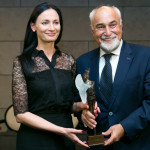 Thisyear, the Angelus Central European Literature Award went to Varujan Vosganian − a Romanian writer born to a family of Armenian ethnicity and the author of Cartea șoaptelor (tr. a book of whispers, published by Książkowe Klimaty). The book was translated into Polish by Joanna Kornaś-Warwas, who received the Translator Award. Cartea șoaptelor also received Natalya Gorbanevskaya Audience Award.
Thisyear, the Angelus Central European Literature Award went to Varujan Vosganian − a Romanian writer born to a family of Armenian ethnicity and the author of Cartea șoaptelor (tr. a book of whispers, published by Książkowe Klimaty). The book was translated into Polish by Joanna Kornaś-Warwas, who received the Translator Award. Cartea șoaptelor also received Natalya Gorbanevskaya Audience Award.
MACIEJ ROBERT
The Armenians, or the world
Varujan Vosganian, a Romanian writer born to a family of Armenian ethnicity, is a remarkable writer (three countries has nominated him for Nobel Prize in Literature: Romania, Armenia, and Israel). His most important book − Cartea șoaptelor tells about the most dramatic event in the history of Armenia, that is the Armenian Genocide in Ottoman Turkey in the period between spring 1915 and fall 1916. In a way, Cartea șoaptelor is the most important description of this tragedy. The Republic of Turkey never recognized the mass killings as genocide; actions were taken to assure that evidences or documents were not accumulated. Vosganian’s novel is a call to honour memory of those who fell victims a century ago; as the memory of the past is kept by generations, but it gets weaker with time. Vosganian wants people to finally start to talk about this least known hecatomb of 20th century. Cartea șoaptelor is a homage to a million of victims, an attempt to restore their history, an important voice in the debate over recognition of the mass killings as genocide, and, as such, it is an important element for building Armenian identity. Vosganian, who is also a politician, treats literature as a duty of citizens and the nation. This is the reason why every time the book is translated into a different language, we speak about something more than a literary event – Polish translation was published on 24th April 2015, one hundred years after the massacre. Moreover, in many cities around the world fragments of Cartea șoaptelor were read in order to commemorate the centenary (Worldwide Reading Commemorating the Centenary of the Armenian Genocide).
The Armenian Genocide is a starting point in the book – like it is a “founding trauma” for the Armenians. Still, the writer does not devote his entire book to the crime, it is only one of the episodes in the Armenian epic. Vosganian finds the events before 1915 and the consequences of the massacre equally important. Cartea șoaptelor is a record showing how the Armenians dealt with their painful history. The writer focuses on the Armenian refugees who have fled to Romania; the first refugees arrived there in the 1920s. Among them there were the writer’s grandparents. Vosganian has used their memories to build the book storyline. It is a quite important aspect as this biographical element, which makes the story take an inevitable course to nostalgia, successfully counterpoints the reportage style used to describe the horrible crimes. A personal narration, characteristic chattiness as well as presenting various incidents and events like anecdotes (which to a large extend turn the book characters into heroes from legends or myths) may mislead the readers – as Vosganian admits, some of his readers could not believe that the characters he presented were real. Still, even though Cartea șoaptelor is full of the stories which seem to be fictitious, it is based on real events, thorough research, and documentation. Moreover, it gives the readers much more than history of Armenians in the 20th century. Vosganian’s book – a story about forgiving, revenge, memory, relations between the victims and torturers – tells about cruelty, which still drives the world.
Varujan Vosganian, Cartea șoaptelor, translated by Joanna Kornaś-Warwas, Publishing house: Książkowe Klimaty, Wrocław 2015
Varujan Vosganian was born on 25th July 1958 in Craiova. He grew up in Focșani. He studied at the Bucharest Academy of Economic Studies (graduated 1982) and at the University of Bucharest, Faculty of Mathematics (graduated 1991). He holds Ph.D. degree in economics; he is a member and founder of the Romanian Economic Association, an international advisor of Centre for European Policy Studies based in Brussels, a member of Young Politicians’ Club (London). Vosganian was Romania’s Minister of Economy and Commerce in the period 2006–2007, Minister of Economy and Finance until October 2013. Vosganian has written several books, not only fiction and poetry, but also works on economics. He is also vice president of Romanian Writers’ Union. Cartea șoaptelor is his first novel; it was published in 2009 by Polirom publishing house and there were two reprints. In 2012 and 2013 three countries nominated him for a Nobel Prize − these were Romania, Armenia, and Israel. Last year the writer published Jocul celor o sută de frunze și alte povestiri (tr. a game of one hundred leaves and other stories, published by Polirom in 2013).
****************************************************************************************************
Angelus Award 2016 goes to Varujan Vosganian – a report on the Gala
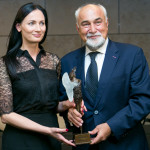 If we are to make humankind better, politics or history are of no help, we can use only culture, said Varujan Vosganian, a Romanian writer, the author of Cartea șoaptelor (tr. a book of whispers, published by Książkowe Klimaty) and the winner of the Angelus Central European Literature Award 2016.
If we are to make humankind better, politics or history are of no help, we can use only culture, said Varujan Vosganian, a Romanian writer, the author of Cartea șoaptelor (tr. a book of whispers, published by Książkowe Klimaty) and the winner of the Angelus Central European Literature Award 2016.
The jury announced their verdict on Saturday evening, 15th October, during the great Gala held in the Capitol Musical Theatre.
Varujan Vosganian is a double Angelus award winner as he was awarded Natalya Gorbanevskaya Audience Award. Art should not draw any conclusions. Conclusions kill art. Art is a sort of testimony and these are the readers who draw conclusions; in some way everyone who reads becomes a writer, said the author when receiving Natalya Gorbanevskaya Audience Award.
Only few minutes later he was announced the winner of the Angelus Award 2016. Mykoła Riabczuk, chairman of the jury, who presented the award, said: the choice was not easy, because in the finals we had seven wonderful writers and seven books which deserve to be awarded. Long and serious discussions were needed to choose the winner.
Vosganian, a Romanian born to a family of Armenian ethnicity, is the author of Cartea șoaptelor published by Książkowe Klimaty, a publishing house from Wrocław. The book was translated into Polish by Joanna Kornaś-Warwas, who received the Translator Award the same night.
Cartea șoaptelor has an elaborated structure. It tells about the Armenian Genocide in Ottoman Turkey in 1915. The book is not a report on the tragedy, but a call for commemorating the victims. The Republic of Turkey never recognized the mass killings as genocide; Turkish government has failed to conscientiously accumulate evidence. Now, the number of original documents relating to the events is low, witnesses who are still alive will soon pass away, and in Turkey this is a taboo. Vosganian takes an attempt to protect and honour memory of the victims – here we speak about up to 1.5 million Armenians. Cartea șoaptelor is the first novel by Varujan Vosganian, who is not only a writer and a poet, but also a recognised economist and politician. The book was published in 2009 and there were two reprints.
Three years ago I met Joanna Kronaś-Warwas the first time and agreed to her translating my book into Polish. Then, when she presented it to the publishing houses, she tried to convince the publishers that the book could win the Angelus award, said Varujan Vosganian. I believe that by describing such a great tragedy I have described all tragedies of this world. Great tragedies do not have one language. If we take a perspective of history, death is something abstract, it is defined with a number, there are many zeros. In literature there are no numerals, people die and suffer themselves, said the writer when receiving award handed out by Rafał Dudkiewicz, mayor of the city of Wrocław. If we are to make humankind better, politics or history are of no help, we can use only culture. Culture is the way to Damascus, it will save us.
The Angelus Central European Literature Award is funded and organised by the City of Wroclaw. The winner is chosen by the jury consisting of Mykoła Riabczuk, Professor Stanisław Bereś, Piotr Kępiński, Tomasz Łubieński, Krzysztof Masłoń, Justyna Sobolewska, and Mirosław Spychalski. The main prize is a statuette designed by Ewa Rossano and a cheque in the amount of 150,000 PLN. If the Angelus Central European Literature Award is given to a foreign writer, the Translator Award, which is a cheque in the amount of 20,000 PLN, is also presented.
Agnieszka Kołodyńska
****************************************************************************************************
Maciej Robert writes about Anna Janko books
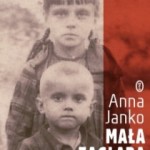 On 1st June 1943, in reprise for presumed cooperation between village dwellers andguerrillas, special force units of Wehrmacht and SS brutally pacified Sochy, a village in South-East Poland, close to Zamość. German soldiers burnt one house after another, killed Sochy dwellers, and completely destroyed the village. Out of several hundred people, only few survived. Among them, there were the Ferenc siblings – Jaś, Krysia, and Teresa, called Renia. Nine-year old Renia did not utter a single word for a week after the massacre. Then she cried for a year. Later, being a grown-up already, she used to go back to these traumatic memories quite often. Teresa Ferenc has unintentionally passed the war trauma to her daughter, who many years later, wanting to confront this ”post-memory,” writes: I imagine or remember. Fear is a kind of memory, so I can say so. An inherited fear, received in prenatal life, the one that comes with mother’s milk; fear which is supposed to protect the young from danger.
On 1st June 1943, in reprise for presumed cooperation between village dwellers andguerrillas, special force units of Wehrmacht and SS brutally pacified Sochy, a village in South-East Poland, close to Zamość. German soldiers burnt one house after another, killed Sochy dwellers, and completely destroyed the village. Out of several hundred people, only few survived. Among them, there were the Ferenc siblings – Jaś, Krysia, and Teresa, called Renia. Nine-year old Renia did not utter a single word for a week after the massacre. Then she cried for a year. Later, being a grown-up already, she used to go back to these traumatic memories quite often. Teresa Ferenc has unintentionally passed the war trauma to her daughter, who many years later, wanting to confront this ”post-memory,” writes: I imagine or remember. Fear is a kind of memory, so I can say so. An inherited fear, received in prenatal life, the one that comes with mother’s milk; fear which is supposed to protect the young from danger.**************************************************************************************************
Kępiński writes about Alvydas Šlepika’s prose
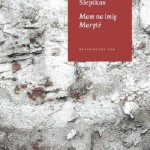 Among the ANGELUS Central European Literature Award semifinalists we may find two Lithuanian books: Silva rerum by Kristina Sabaliauskaite (publishing house: Znak) and Mano vardas – Marytė by Alvydas Šlepikas (tr. my name is Maryte; publishing house: Kolegium Europy Wschodniej). Today we present Piotr Kępiński’s article on Alvydas Šlepikas and his prose.
Among the ANGELUS Central European Literature Award semifinalists we may find two Lithuanian books: Silva rerum by Kristina Sabaliauskaite (publishing house: Znak) and Mano vardas – Marytė by Alvydas Šlepikas (tr. my name is Maryte; publishing house: Kolegium Europy Wschodniej). Today we present Piotr Kępiński’s article on Alvydas Šlepikas and his prose.
In Poland a lot was written on wolf children. This topic is by no means avoided or neglected. Seven years ago there was an interesting article published in Newsweek magazine. It described fortunes of German children who wandered around Lithuania looking for food and shelter right after the WWII. Many of them were adopted by Lithuanian families from Kaunas or Vilnius. Many of them returned to Germany after Lithuania restored independence. “Now, there are around hundred Wolfskinder. Majority of them does not speak their native language, but almost all of them know German songs or nursery rhymes.”[i]
Stories like that are told by Alvydas Šlepikas[ii] is his excellent book Mano vardas – Marytė, which was presented at the book fair in Cracow.
The absorbing novel by a writer and scenarist who is well-known in Lithuania was based on true stories of wolf children and their relatives.
Using reportage and almost emotionless style, which is sometimes counterpointed with some poetry, Šlepikas describes the fortunes of little Renata who lives in a forest and hides her German origin. She lost her parents in war. Friends and relatives disappeared. After 1945, she was adopted, got a new Lithuanian name – Maryte, and started a new life.
However, between leaving the family home and being adopted, though it was a short period, Renata went through an absolute hell.
How to describe it so that it does not sound in a banal way? Only few are able to do so and Alvydas Šlepikas seems to be one of them. He drawn delicate lines. There are no big words or unwanted pathos. Just like Borowski or Nałkowska, the Lithuanian author writes only about what he has heard. There are no unnecessary lines or judgements.
As it is difficult to evaluate the world Renata lived in. Almost everyone was a villain: Germans, Russians, and Lithuanians, who were sometimes treated as enemies by the wolf children.
Luise Quitsch who grew up in Kaunas and went by name Alfreda Pipireite told her story to Newsweek:
Her adoptive parents, a shoemaker and a teacher, had their own two adult children. The small German girl was not pampered.
Whenever she was disobedient, they told her to pack her things and beg in the streets. Still, they never carried out their threat. Quitsch attended a local school, she quickly learned Lithuanian and other languages. She married a Lithuanian, got a job in Vilnius, and were almost sure that her German past was only a dream.
One day in 1985 she was passing a toy shop. There was a wooden jester on the display. She automatically used a German word Hampelmann. This was a moment when she discovered her origin. “After the fall of Communism, I found my siblings in Germany and started to learn my native language again,” she told Newsweek. She even thought about moving to Germany but she failed to convince her husband to do so.
Others made it. In the 90’s most Wolfskinder, who were able to speak German, moved to their mother country, now democratic and wealthy. Not all families they found welcomed them with open arms. They were afraid that they will need to provide for the poor relatives from the East.
In Lithuania, after the war, they also could not enjoy an easy life. They were alienated, living on the margin of society.
Šlepikas managed to describe it real well, not only the wolf children’s fortunes, but also their minds – and this seems to be the most important and most interesting element of his novel. Still, the readers do not get an impression that they are intruders.
Just the opposite, thanks to Šlepikas’ considerate narration, the readers carefully and silently follow the tragedy.
[1] „Wilcze dzieci.” Newsweek Polska, 17 Aug 2008, www.newsweek.pl/swiat/wilcze-dzieci,33394,1,1.html.
[ii] Alvydas Šlepikas (born in 1966) – a Lithuanian poet, playwright, and actor. He graduated from the Lithuanian Academy of Music and Theatre in Vilnius, majored in acting and directing. He worked in the State Small Theatre of Vilnius. He published two volumes of poetry, a collection of prose, and a novel Mano vardas – Marytė. His works were translated into ten languages, including English, Russian, and German. He is a member of the Lithuanian Writers Union. He was the editor-in-chief of a cultural weekly magazine Literatūra ir menas. Currently, he is in charge of the section on modern literature and translation.
Renata Lis, W lodach Prowansji, Publishing house: SIC! / Warszawa 2015
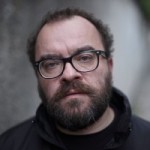 Modern Polish poetry, being a natural, polyphonic, and outstanding phenomenon, perfectly fulfils its responsibilities.
Modern Polish poetry, being a natural, polyphonic, and outstanding phenomenon, perfectly fulfils its responsibilities.**********************************************************************************************************
UNESCO World Book Capital Wroclaw
On 23rd March 2016, Wroclaw takes over the title of the UNESCO World Book Capital City from Incheon in South Korea. Wroclaw – the capital city of Lower Silesia had been awarded the title in recognition of the city’s preparation of an “outstanding programme aiming at the promotion of reading among a broader audience for a whole year.” Wroclaw has thus joined great cities like Madrid, Bangkok, Amsterdam, Buenos Aires, or Toronto.
The weekend of April 22nd – 24th, 2016 will inaugurate the programme of the World Book Capital City UNESCO, one of the key literary projects of the European Capital of Culture Wroclaw 2016. Then, there will many meetings with writers and poets, workshops, exhibitions, performances, concerts, and even dancing parties.
The 22nd of April will be the Korean Night: the vernissage of an exhibition and a meeting with Iwona Chmielewska devoted to her book Maum, which was first published in Korea and has been awarded the prestigious Bologna Ragazzi Award, also called the Nobel Prize of children’s literature, will take place. In the evening, one may attend the official opening of Goethe-Institut Pop Up Pavillon and a meeting with Olga Grjasnowa and Filip Springer. Moreover, on that day, the Night of Ukrainian Music and Poetry NON STOP and a concert by the singer Mariana Sadovska are organised as a part of “Lviv Month.”
On the 23rd of April, various workshops and meetings for children with take place in Barbara, the info point of the European Capital of Culture Wroclaw 2016. On the very same day, there will be a meeting with an outstanding Norwegian crime fiction author – Jo Nesbø. Moreover, the European Literature Night will start at 7 pm – this event comprises a series of night readings given by well-known public figures in various venues that are not usually associated with literature. This year, famous Polish actors, writers, and representatives of the world of culture like Tomasz Karolak, Bartosz Porczyk, or Ewa Skibińska will read, among others, excerpts from works by William Shakespeare, whose 400th death anniversary is celebrated in 2016. The readings will be followed by a DJ duel between Agnieszka Szydłowska and Michał Nogaś who will focus on the topic “BOOK IS A DJ.”
The 23rd of April is also the day when the Ossolineum will officially inaugurate the main exhibition of the Pan Tadeusz Museum. The Ad Spectatores Theatre will stage The Street of Crocodiles, while Adam Mickiewicz will meet his readers in the Market Square.
On the 24th of March one can witness an open-air spectacle titled Shakespeare – Speranza. Actors representing Helena Modrzejewska Theatre from Legnica will occupy the Market Square where they will present fragments of the British master’s famous plays, accompanied by the music of Kormorany. They will wear costumes designed by Małgorzata Bulanda. In the evening, Singing Shakespeare, a night concert featuring the choir of the National Forum of Music conducted by Agnieszka Franków-Żelazny in Narodowe Forum Muzyki, will take place. The performance will be complemented by Tomasz Lulek’s interpretations of texts by Shakespeare.
The World Book Capital City UNESCO Wroclaw 2016 programme will evolve as more and more events will be scheduled in the course of the year: there will be special editions of festivals, various international events; librarians, children, and young adults will be engaged; many events will be organised in the public space; new technologies will be used. The organisers promise that the ending of Wroclaw’s term will be heard (literally, it will be sung) in dozens of cities all over the world. This will be possible thanks to two great figures of Polish culture, namely Tadeusz Różewicz and Jan Kanty Pawluśkiewicz. They will meet in the Book Aid project, the book’s international UNESCO anthem. The music will be composed by Pawluśkiewicz, while one of Różewicz’s poems, Włosek poety, will serve as the song’s lyrics.
Read more at http://www.wroclaw2016.pl/
***********************************************************************************************************
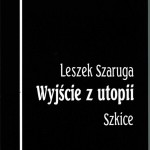 Fragments of an essay about Polish fascination for Czech culture are a part of a recently published book Wyjście z utopii written by Leszek Szaruga, an excellent critic and poet
Fragments of an essay about Polish fascination for Czech culture are a part of a recently published book Wyjście z utopii written by Leszek Szaruga, an excellent critic and poet
Leszek Szaruga
THE CZECH LESSON
In his famous essay The Priest and the Jester, Leszek Kołakowski describes two attitudes towards reality: The priesthood is … a survival of the past intact in the present, an outgrowth of itself. It is not only a certain intellectual attitude toward the world, but a certain form of the world’s existence – a factual continuation of a reality which no longer exists. In the attitude of the jester, on the contrary, a mere possibility materializes and becomes real in him before it exists in fact. For our thoughts about reality are also part of reality, no less important than other parts. He concludes: We declare ourselves in favor of the jester’s philosophy, and thus vigilant against any absolute; but not as a result of a confrontion of arguments, for in these matters important choices are value judgments. … Thus we opt for a vision of the world that offers us the burden of reconciling in our social behavior those opposites that are the most difficult to combine: goodness without universal toleration, courage without fanaticism, intelligence without discouragement, and hope without blindness (1968).
The essay was one of the mandatory readings of Polish intellectuals at the turn of the 1960s, i.e. a time when the opposition circles aware of the fact that “it cannot take any longer” started to form. In the song titled The Song of the Sea written at that time, Jan Krzysztof Kelus presented the attitudes and situation of these groups: Maybe March or August, who knows,/ did not let you agree to evil any longer/ instead of changing the world, your address has changed to/ Rakowiecka 37.[i] It was the new address for those who adopted the attitude promoted in the essay by the author of Main Currents of Marxism. There, behind the bars of Mokotów Prison, facing some obstacles – as the prison warders cut away fragments of articles from the newspapers delivered to the prisoners – but cherishing some hope, everyone tried to follow the Prague Spring events taking place in 1968. Then one could often hear a slogan “Poland is waiting for its Dubček.” Stories about sophisticated tricks of the Czech people, who in order to impede life of the Warsaw Pact troops getting around the city, swapped street name plates, circulated everywhere. While listening to Král a klaun, the prisoners translated Karel Kryl’s songs about the invasion into Polish.
At that time, a vast number of viewers saw films categorised as “the Czech film school,” for example Forman’s Loves of a Blonde and The Firemen’s Ball, Menzel’s Closely Watched Trains, or Němec’s A Report on the Party and the Guests. Shortly after that, in the 1970s, translations of the novels The Cowards by Škvorecký and The Joke by Milan Kundera were published. Those who have read The Good Soldier Švejk could not doubt that there were some significant and, what is more important, attractive changes in the culture of our southern neighbours. It was confirmed by works by Josef Škvorecký, Bohumil Hrabal, poems by Miroslav Holub or Jaroslav Seifert. Even though Czechoslovakia was occupied, repressions were growing, and the process of „normalization” only restricted freedom of speech, the news of the things happening there leaked outside the country and many of us interpreted the artistic undertakings of Czechs and Slovaks to be one of the ways of adopting the Jester attitude defined by Kołakowski. This way was also expressed in Ludvík Vaculík’s foreword to anthology of Czechoslovak independent literature: Fortune of a Czech writer depends on (and probably it will not chance for a long time) his or her answer to a very personal question about the nature of creative activity. The things which are obvious (the world is given) in other professions – this non-obviousness can be discovered only once one engages in philosophical reflections – become a crucial issue here, because writing a priori is defined in terms of problems which cannot be ignored in any way. Only when the Czechs decide to reject the nonobvious life, I will offer you a pseudo-world together with its assured facts.
The list of the underground publications on Czech and Slovak literature in Poland is almost 200-record long, which proves that there was a considerable interest in them (for obvious reasons, underground publishers gave more attention to literary life of Russia and Russian writings – around 500 works). A special editions of Zapis, Krytyka, and Puls were devoted to Czech and Slovak literature. An editorial note of Zapis states: The presented below selection of Czech articles written in the period between the January and March last year [in 1977] is not supposed to be an illustration … of repressing and defaming activities, though it openly shows a disgusting reality ruled by police in Prague today. More importantly, we have an evidence of o t h e r l i f e of the Czech opposition: its rejecting violence, not departing from moral and political democracy norms, a bold manifestation of one’s existence as well as a hard work, an astonishing creative inspiration, a philosophical mind-set, humour, and care to never fall short of high standards.
Then, it was the „other life” that Polish readers found especially interesting as it, not understood as different from “a disgusting reality ruled by police,” because it was something obvious for the opposition in the Soviet bloc, was different from life in Poland, at least these works presented it so; this otherness was the most fascinating thing. One could say that the difference between these two reactions to the repressing system was a difference between two models of culture: Polish model of culture of fighting and Czech model of culture of game, or event amusement.
…
It can be assumed that attractiveness of the Czech independent literature was mainly related to its lightness, humour, and non-seriousness which are based on ludic trend in the European tradition. The sources of this tradition were found in Rabelais’s works by Mikhail Bakhtin, who showed their continuation in Gogol’s writing: We see, then, the clash and interaction of two worlds: one that is completely official and established, legalized by ranks and uniforms so colorfully sketched in the dream of the exciting “life in the capital”; and one where all is humorous and non-serious, where laughter is the only serious element. The nonsense and absurdities introduced by this world turn out to be their exact opposites – the true connecting internal geneses of the other, the external. This is the light-hearted absurd of the popular sources whose many verbal correspondences were accurately cited by Gogol. Consequently, the Gogolian world is always located in the zone of contact (just as every portrayal of laughter is). In this zone all once more becomes tangible. The verbal representation of food can arouse an appetite, and it is also possible to portray discrete movements analytically without destroying their wholeness. Everything becomes real, contemporary, existing in actuality.[ii]
[i] The song was written in Polish. The exact lirycs were Może marzec lub sierpień kto wie/ nie pozwolił ci już dłużej na godzenie się ze złem/ zamiast świata twój adres zmienił się/ Rakowiecka 37M
[ii] Bakhtin, Mikhail, and Patricia Sollner. “Rabelais and Gogol: The Art of Discourse and the Popular Culture of Laughter”. Mississippi Review 11.3 (1983): 34–50. Web https://www.jstor.org/stable/20133922?seq=13#page_scan_tab_contents
*************************************************************************************************************
In January, Wrocław became the European Capital of Culture. This year there will be over thousand events, including literary ones. Here are some of them awaiting for you in the following six months.
UNESCO World Book Capital Wroclaw
Thanks to the prestigious nomination, Wrocław joined great cities like Madrid, Bangkok, Amsterdam, Buenos Aires, or Toronto. Starting from 23rd April, it will hold the title of UNESCO World Book Capital 2016.
Literary Exhibitions
Three multimedia temporary exhibitions presenting Polish and European literary mementoes will be organised in cooperation with the National Ossoliński Institute. The exhibitions will be a unique and innovative combination of tradition and game, a sort of unordinary school quiz. The first one will show the period from Romanticism to Positivism, the second, the period between modernist Young Poland and the 1930’s, and the last will focus on the time between the World War Two to the present. The exhibitions aim at familiarising the young generation with Polish and European literary heritage; they will be accompanied by a wide-ranging educational programme, lectures, conferences and meetings with special guests (writers, literary critics, etc.). Moreover, the organisers will develop and distribute materials for learning Polish.
January – October 2016
Bibliopolis. City as a Library
The aim of the programme is to introduce books into the city space and transform it into an enormous library where literature is present everywhere, sometimes taking on surprising forms. The programme encompasses a variety of activities organised by cultural institutions and non-governmental organizations. The organisers would also like to engage Wrocław’s inhabitants who, among others, may participate in a project implemented as part of a literary magazine Cegła. In 2016 drivers will stick fragments of poetry printed on magnetic stickers to their cars – passing each other in the street, they will create a huge moving poem.
January 2016 – April 2017.
European Literature Night in Wrocław
The aim of the project is to present unknown, not yet published works of contemporary writers. Through entire night, public readings will be given by well-known public figures in various venues that are not usually associated with literature. This year edition of the project will be a part of the opening ceremony marking Wrocław’s taking the title of UNESCO World Book Capital 2016.
23rd April 2016
International Crime Festival Wroclaw
This is the oldest and biggest festival promoting crime fiction in Poland. During the festival the Great Calibre Award for the best Polish crime novel funded by the city of Wrocław along with the Great Calibre of Honour Award for lifetime achievement are presented. The special 2016 edition will be dedicated to European crime fiction.
May – June 2016.
SILESIUS International Poetry Festival
The festival is connected with a special edition of Wroclaw SILESIUS Poetry Award. During the festival, the greatest Polish poetry festivals, like Poets’ Poznań, City of Poetry from Lublin, Milosz Festival from Cracow will be invited to Wrocław to present their programmes.
May 2016
Wroclaw SILESIUS Poetry Award
The award promoting works and creators of Polish poetry, is presented each year in three categories: lifetime achievement, book of the year, and debut of the year. The winners receive a statuette designed by Michał Staszczak and a cheque for 100 thousand PLN for lifetime achievement, 50 thousand for the book of the year and 20 thousand for debut of the year. In 2016, the SILESIUS award gala will be the highlight of the SILESIUS International Poetry Festival.
May 2016
FOR CHILDREN AND YOUNG ADULTS
Book Saved Our Childhoods
Till 1989, the world of European literature for children and young adults was divided – the literature of East and West was developing separately. The organisers want to rediscover the heritage of children and young adult literature written in the communist era. The literary works will be critically analysed in cooperation with cultural institutions from the former Eastern bloc countries; the result will be a compendium presenting this heritage. To implement the idea, an international web portal, administered by the most important organisations and literary circles will be created. There will be articles in English and national languages. The initiative will also allow readers from other regions of Europe to better understand the time when the current creators of the culture of the new world were raised.
Writing Forum for Children and Young Adults/Make Your Own Book
A series of creative writing workshops for young adults who live in Wrocław and Wrocław agglomeration. The workshops will be run by experts in prose, poetry, literary journalism. The participants will have a chance to meet prominent authors who write books for children, young adults, or adults. The works created during the workshops will be presented on 22nd April 2016.
Make Your Own Book
Make Your Own Book is a continuation of the Writing Forum for Children and Young Adults. The programme involves organising workshops in schools and libraries in Wrocław. The participants will learn about the process of bookmaking: from paper production, writing and editing, to printing and using new technologies. The works created during the workshops will be presented in April 2016.
Wroclaw. World Book Capital City in the Eyes of Children
For 365 days, secondary schools students will be creating a unique book – a blog. The writing process, coordinated by their teachers, will be accompanied by a series of workshops and lectures for children and young adults. The aim of the project is to promote children and young adults’ creativity, foster their interest in literature and reading.
Festival of Children’s Literature
This is the only Polish literature festival for children, young adults, and their parents which promotes literature and reading using innovative interdisciplinary and intermedia methods. The idea behind the festival is to introduce the books into the city space, transforming the city into a gate to the world of imagination. The festival participants may join various workshops, meetings with authors, artistic projects, film projections. The festival also takes place in Kraków, Gdańsk, and Warsaw, but Wrocław will hold the festival final.
May 2016
Good Pages Young Readers’ Book Fair
During the fair, there are meetings with authors and illustrators, debates, workshops, exhibitions, and performances. Then, a prestigious Good Pages award funded by the Mayor of Wrocław for the publisher of the best book is presented. Another award is given to the winner of the competition for schoolchildren for the best fairy tale – the winner can have their work published.
May 2016
For detailed information see http://www.wroclaw2016.pl/
*************************************************************************************************************
A fascinating autobiography of Zofia Komedowa
„Nietakty. Mój czas, mój jazz” (Szelest publishing house), a brilliant book written by Zofia Komedowa Trzcińska, is already in bookstores. We strongly recommend it. Piotr Kępiński wrote that “it is a perfectly composed, gripping story about an amazing time and fascinating people. This story takes you to the world of music, literature, and film.”
She is called guru of Polish jazzmen. She was Krzysztof Komeda’s muse. He composed Sophia’s Tune and Crazy Girl for her. She was always eager to say „Yes, I was a crazy girl!”
She talked Komeda into dropping out a medical school and beginning musical career. She was his manager, secretary, hairdresser, tailor… Whenever he wrote to her, Komeda began his letters from Hollywood with “Dear Boss!”.
Zofia Komedowa died in 2009, 40 years after her husband. The book is a collection of fascinating memories edited by Zofia’s son. Zofia and Krzysztof are not the sole heroes of the book as there are also stories about Roman Polański, Wiesław Dymny, Piotr Skrzynecki, Jerzy Skolimowski, and Marek Hłasko.
In his article published in Do Rzeczy, Krzysztof Masłoń wrote “Zofia Komedowa-Trzcińska was an exceptional person. The book which presents her memories is also exceptional. The already published fragments promise that the book will violate rules, it will be rebellious and, for many well-known people, unpleasant.”
Marek Zaradniak in Głos Wielkopolski: “Zofia Komedowa-Trzcińska was married to one of the most important Polish jazzman of all times – Krzysztof Komeda. She was his wife and manager. She died six years ago. Two years before her death, she started to dictate memories to her son, Tomasz Lach. Now, the book was published by Szelest, a publishing house. It is a story about Krzysztof Komeda, his career and tragedy as well as about his friends, Poland and the world of that time. That is why the book tells about Roman Polański, Marek Hłasko, Andrzej Kurylewicz and many others.”
According to Piotr Kępiński, „it is a perfectly composed, gripping story about an amazing time and fascinating people. This story takes you to the world of music, literature, and film.”
About Komeda and Zofia Komedowa:
Urszula Dudziak: When I took my first steps on the jazz scene, Zofia Komedowa was my musical, artistic guardian angel. I will always keep her in my heart.
Paweł Brodowski, chief editor of Jazz Forum: Zosia Komedowa was like a hurricane. She a beautiful and charming woman with a heart of a warrior. She paved Komeda’s way for fame, but also fought for Polish jazz. She is a part of its myth.
Paweł Sztompke: His music stays with me. It is stunning that it will always be up-to-date. Time turned out to be kind to Komeda and his music. This is his greatest achievement.
***********************************************************************************************************
Piotr Kępiński writes about Silva rerum, a novel by Kristina Sabaliauskaite
Now, Kristina Sabaliauskaite is a true literature star in Lithuania. Though ten years ago her name was known only to the readers of Lietuvos Rytas, the most popular newspaper printed in Vilnius, as it published her reports from London where she still lives.
The success came quite recently. Sabaliauskaite made her debut in 2008 when she published Silva rerum, a novel which turned out to be a thing. There were awards, translations, honours, medals…
The writer has already published three parts of the saga, which surely every child in Lithuania is now familiar with; her fans know fragments of the saga by heart. The trilogy is so popular that in Vilnius, where the action takes place, there are tours of places described in Silva rerum. Not to get any false ideas, please know that these are cultural events organised by professionals, they are not amateur undertakings.
How it happened that this “decorative” novel which takes place in the 17th century became a bestseller, which is known outside Lithuania and has its own life in Latvia and Poland (an excellent translation by Izabela Korybut-Daszkiewicz)?
How it happened that this static and boring on the surface novel won hearts of dozens of thousand readers who are said to read very little, being more interested in IKEA’s catalogues, tabloids and detective stories?
Sabaliauskaite’s success in Lithuania is easy to explain. The readers from Vilnius and Kaunas has been waiting for a long time for a story based on historical events that explains the presence of Lithuanians, Poles, and Jews in this area in an accessible way, i.e. with no politics, journalist splendour, pompous national fanfare, nor proving something which cannot be proved.
Sabaliauskaite puts it bluntly – we lived next to one another; there was time when we spoke Polish, Polonized, but we accepted and, not free from any conflicts or grudges, treated one another with (a moderate) respect.
Probably, this is the reason why these matters, which were not always well understood in Lithuania, caused such a sensation. In Poland it will be more difficult for Silva rerum to gain popularity as historical novel discussing similar matter already exists.
As far as the books are concerned, the action is simple and has a classic construction – it is a saga. The readers follow the story of the Narwoysz family, who after a great tragedy which stroke Vilnius comes back to this “great Lithuanian metropolis” (as back then everyone who lived in the provinces thought so, probably they still do).
Silva rerum can be read in several ways: one can read random fragments, from cover to cover, or in a chaotic way. I can assure you that every method is good – you will not miss anything, probably because the book is well written, its construction is elaborate. Some parts of the book sound like prose poetry, others like detective or gloomy baroque ghost stories.
*************************************************************************************************************
ANGELUS 2015 TV
Angelus 2015 for Serhiy Zhadan
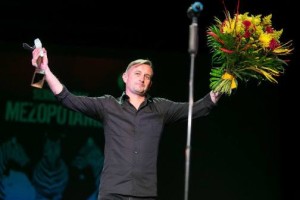
phot. Tomasz Wałków
The Ukrainian writer Serhiy Zhadan, the author of ‘Mesopotamia’ (Wydawnictwo Czarne) and his translators Michał Petryk and Adam Pomorski won the 10th Angelus Central European Literature Award 2015 granted by the Wroclaw City to prose writers from Central Europe.
The official award ceremony took place on Saturday the 17th of October in the Capitol Music Theatre.
‘I would like to thank the City of Wroclaw, the publishing house and the translators,’ said Serhiy Zhadan at the moment of receiving the Angelus Award. ‘Awards like these are a good opportunity to notice contemporary problems. Today a number of Ukrainian citizens, including Nadiya Savchenko [a Ukrainian pilot who was taken captive by pro-Russian rebels during the war in Donbass in June 2014 – note from editors], are political prisoners in the territory of the Russian Federation. We must remember, particularly in Central Europe, that these people are imprisoned unlawfully,’ he stressed. ‘I want to express my solidarity with them and shift your attention from literature to them.’
Serhiy Zhadan was born in Starobilsk in 1974 and lives in Kharkiv. He is a poet and a writer, and his books have been translated into 16 languages. He translates from German. His books ‘The History of Culture’, ‘Big Mac’, ‘Depeche Mode’, ‘Anarchy in the UKR’, ‘Anthem of Democratic Youth’, ‘Voroshilovgrad’ and ‘Mesopotamia’ have been published by Wydawnictwo Czarne in Poland. Apart from that, Zhadan is a singer of the band Sobaky v Kosmosi; the Ukrainians know his songs by heart. The writer is also the face of the Maidan; he speaks about Ukraine and argues that the situation in his homeland is caused by the need for changes and the fact that people are fed up with living in the post-Soviet reality.
However, the novel for which the award went to Zhadan – ‘Mesopotamia’ does not refer to politics. It is a multi-thread story of the inhabitants of Kharkiv. It is a place where people drink, fight, are overwhelmed by everyday life and enslaved by their own expectations, incapacities and ambitions. But, at the same time, they are also able to love, even though love described by Serhiy Zhadan does not always win and fails to change anything. Zhadan’s novel brilliantly reflects Ukrainian reality and the moods and feelings of the Ukrainians.
’For us, Ukrainians, it is important to feel support from Europe and be in the same cultural space at the moment. Believe me, this expression of solidarity with our country is much more important than any financial awards. It is a pleasure to know that Polish and Ukrainian culture are in such close contact with each other. I hope that prestigious literary awards will also be granted in Ukraine in the nearest future and that such an award will be received by a Polish writer,’ said Serhiy Zhadan to journalists after the Angelus Award gala. ‘For me, culture and art are not just entertainment and fun. I have always treated literature as a means for speaking about important things and drawing people’s attention to significant issues. Today Ukraine is experiencing a difficult period and many people in Ukraine need support and solidarity. I would consider it dishonest not to mention them all at the moment of receiving an international award. I believe that the audience of Capitol is not only interested in literature, but also wants to understand what is happening in Europe,’ he explained.
The Natalya Gorbanevskaya Readers Award went to the Romanian writer Lucian Dan Teodorovici. His novel ‘Matei Brunul’ in the Polish translation by Radosława Janowska-Lascăr (published by Amaltea/Oficyna Wydawnicza ATUT) received most votes in the poll carried out on the website of the Angelus Central European Literature Award.
At the moment of receiving the award from the Mayor of Wroclaw Rafał Dutkiewicz and the chairman of the Angelus jury Mykola Ryabchuk, Lucian Dan Teodorovici said: ‘It is a great honour for me to be one of the people nominated for Angelus. I am in the company of excellent authors whom I read and admire. The Readers Award is a special bonus, because the book is not addressed to the masses, but to each reader individually. I would like to thank the jury and the two ladies who have believed in me and supported my book: the publisher Ludmiła Anna Koza and the translator Radosława Janowska-Lascăr,’ added Teodorovici.
The Angelus Central European Literature Award is granted by the City of Wroclaw. The winner is selected by the jury consisting of the chairman Mykola Ryabchuk, Professor Stanisław Bereś, Piotr Kępiński, Ryszard Krynicki, Tomasz Łubieński, Krzysztof Masłoń, Justyna Sobolewska, Mirosław Spychalski and Professor Andrzej Zawada. The winner of the award receives a statuette designed by Ewa Rossano and the amount of 150,000 PLN. If the Angelus Award goes to a foreign writer, a separate award financed by the Angelus Silesius University of Applied Sciences in Wałbrzych (in the amount of 20,000 PLN) is also granted to the translator of his book.
Natalya Gorbanevskaya Reader’s Choice Award
Natalia Gorbaniewska Reader’s Choice Award was awarded for the second time this year. The Jury of 'Angelus’ has established it, so as to honour the memory of Natalia Gorbaniewska, a prominent Russian poet and translator who died in 2013. She was a legend of the dissident movement in the Soviet Union and the first president of the Angelus’ jury.
Lucian Dan Teodorovici (born 1975) is a Romanian writer, theatre director, as well as film and television screenwriter. He is the author of several novels and a play. His book came out in the US, France, Britain, Germany, Italy, Spain, Hungary, Egypt, Macedonia and Bulgaria. Published in 2011, the novel 'Matei Brunul,’ has won major national awards and has been recognized as 'Book of the Year.’ It was translated it into French, Hungarian, Polish, Bulgarian, Macedonian and Turkish.
The main character of Teodorovici’s novel – Matei Brunul- is an Italian-Romanian puppeteer, who, as a result of an absurd coincidence becomes a victim of Stalinist repression, along with his doll. After a fabricated process and torture in prison in Bucharest, he lands in Romanian labour camps. As a result of an accident, he is struck with amnesia – he loses the memory of the last twenty years of his life. The Securitate decides to take advantage of this fact and turn him into a deeply devoted 'new socialist man.’
***********************************************************************************************************
Beauty of the East
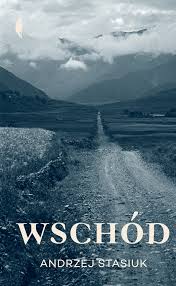 The East is a structure made of ideas, memories, worries, and emanation of space which is both magnetic and expansive at the same time. Andrzej Stasiuk travels East following the ways he knows – aesthetics, presence of the things originating from “there” and people who came from the East as well as personal memories connected with the visits at his grandparents’ who live in Podlachia.
The East is a structure made of ideas, memories, worries, and emanation of space which is both magnetic and expansive at the same time. Andrzej Stasiuk travels East following the ways he knows – aesthetics, presence of the things originating from “there” and people who came from the East as well as personal memories connected with the visits at his grandparents’ who live in Podlachia.
The East constantly makes its presence known – we can feel it in various incidents we are involved in witnessing history, officers in the streets of Warsaw in the era of the Polish People’s Republic, relations between people, store shelves filled with ordinary goods “coming from there.” Therefore, in Stasiuk’s novel the readers may find war, stories told by relatives, ideas of a boy who, safe in his attic, is reading a book about ancient China and starving Chinamen. We cannot forget about the Polish People’s Republic where the East is something embarrassing or ugly. There the East is also identified with unattractive goods like badge with a photo of Lenin – something you cannot trade for anything valuable.
The same East has a great power to attract; it provokes so that one wants to come to grips with it, see the boundaries. But there is no room for miracles – an airport is grey and made of concrete as one would expect, the crowd is automatically pushed from one place to another with no empathy. The cities are either gloomy places or space where one needs to confront almost-imperialist reality which is boring and stereotypical. Therefore, the author’s imagination takes us for a trip to Russia, Mongolia, and China. The space is another character in the novel along with its immaterial form and overwhelming rather than soothing nature. The author states that the system created in the Soviet Russian was not materialism as the system fought with the matter as such.
The novel has a nonlinear narrative structure as the past takes place at various levels, while the present is shown as numerous stops on the trip or different events which are connected with one another. These are accidental meetings that are a way to tell about a given place like meeting a girl who collects coins at a shop, travelling with a lorry driver to Mongolia, having to deal with Chinese police… Still, there is a recurring motif in this trip to the East, namely the author’s meetings with his mother. Stasiuk’s adventure with the East starts with his family and that is why family life and relations are so important in this book.
It is difficult to simply classify The East as a travel novel, as it is more of a trip to the author’s ideas and experiences rather than a simple narration with attractive or exotic scenes. One cannot treat it as a universal pattern that explains how the world works or imposes anything either.
Patrycja Spychalska
Andrzej Stasiuk The East, Publishing house: Wydawnictwo Czarne 2014
************************************************************************************************************
The Birds of Verchovyna
Patrycja Spychalska writes about Ádám Bodor’s book The Birds of Verchovyna which got into semi-finals of Angelus Award
Ádám Bodor’s novel is set in a place at a certain distance from Lviv and Transylvania. Hungarian, which is equated with Transylvania, stands for nostalgia and adventure. Still, it is not really important as this „place” is not-existent. It is the other side of the world − its description contains elements which are characteristic for the region, but as a whole, it is a surreal and autonomous universe. If one was to compare it with the film world, we could say that we have our own Twin Peaks. Similarly charming and scary.
Mark Frost and David Lynch’s project and The Birds of Verchovyna have a lot in common. The dialogues the characters engage in and situations they have to face are sometimes absurd; they are completely out of touch with the main narrative axis (tough it is the reader who needs to decide what the narrator is actually saying and what actually happened − a mystery in itself), ironic, or coarse. Bodor’s style and the world he describes reminds of Gabriel Márquez’s writing but we cannot speak about borrowing a recipe for magic realism. Bodor has his own style, he often plays with the readers as he starts with a subtle description and suddenly takes them to a bizarre or brutal reality that the characters need to confront. Besides, none of the characters from The Birds of Verchovyna can be easily classified. There is the main narrator but his role and emotions are not of key importance for the book as a whole. It is also difficult to say when the action takes place. The language and conditions suggest that it is in the past, but references to the present time, i.e. tools, devices, sayings, or speaking about 21st century are equally important.
Therefore, what are The Birds of Verchovyna about? It is a story of a settlement which can offer geothermally heated groundwater. The settlement is administered by Anatol Korkodus, a brigadier. The narrator, a grown-up man who spent some time at a youth detention center and was a protégé of Korkodus, goes back to the time when the disintegration of the settlement started. Naturally, the destruction is connected with some important events and characters. Being the beginning of the unavoidable, they are perceived as symbols by the rest of the presented characters. For example, one of those events is disappearance of all birds from the neighbourhood. It is connected with another important thing, namely, a sense of threat and presence of Others. The Others are a part of a structure which can be perceived as an element of a totalitarian regime. Their presence can be seen in the way the settlement is administered, visits that everybody knows of but nobody has actually seen, and Korkodus himself as he is a representative and, in the end, a victim of the system. A recurring theme is the end of brigadier; to be more specific − his arrest. This unavoidable submission to machinery of the system with no name nor reason corresponds with Franz Kafka’s vision presented in The Trial. The description of the arrest and the persons involved is typical. The brigadier is ready for the arrest and waits for a sign, the messenger who represents the system is Balwinder − Korkodus’ assistant and “a person who does everything for local offices.” It is him who informs Korkodus about the arrest. The exposure of Balwinder does not mean that the system exposes itself so that it can be described and then studied. The same man returns to the office of the arrested brigadier and takes his role of a helper/doormat as he always does; he even engages in a conversation with the narrator (a witness to the previous night events) about the brigadier’s disappearance as if nothing happened. The narrator adopts the same style. There are simply some things that cannot be discussed nor named.
The Birds of Verchovyna can be interpreted in many ways. It can be perceived as a realistic and magical story about a non-existent region of Central Europe. One can also try to decide how various characters and events are important for the narrative axis or even treat individual episodes as independent funny, bitter, or scary stories. Moreover, the novel presents a model showing presence of totalitarianism and way of behaving when functioning within the structure of hierarchy and power. No matter what approach the reader intends to take, the story Bodor tells is very absorbing.
Patrycja Spychalska
Ádám Bodor The Birds of Verchovyna, translation Elżbieta Cygielska, Publishing house: Wydawnictwo Czarne 2014
***********************************************************************************************************
Discovering Eldorado of books
Irek Grin – curator responsible for the literature and readership programme of the European Capital of Culture 2016 and coordinator of the programme of World Book Capital City 2016 – tells us about the next year’s events.
Mirosław Spychalski: Wrocław is the European Capital of Culture 2016 and the World Book Capital City 2016. What does it mean to literary life and readership in the city?
Irek Grin: Now, few months before the beginning of the next calendar year, it means an opportunity. One should realise that the scale (saying scale I do not mean effective gadgets but engaging large social groups) of some of the planned events and programmes would not be so large if it was not for the Capitals. On one hand side, it is a question of money − we will simply have more to spend than we usually do, on the other hand, it is an undoubtedly favourable political decision, and, thus, it is greatly speeding the process of change in culture through setting time limits. A deadline is incredibly stimulating. At the same time, one may observe that all curators engaged in preparing the artistic program of the European Capital of Culture 2016, despite the area they are responsible for, became long-sighted, they think in a long-term way, they work to achieve long-term changes. Therefore, year 2016 requires discipline, but we treat it as the opening of a new chapter, rather than afterword.
Could you tell us what philosophy did you adopt when you worked on the literature program of the European Capital of Culture 2016? What are its underlying assumptions?
Though various people who criticise all actions we take think that we are responsible for everything, it is not so. The European Capital of Culture 2016 will not solve all the existing problems and it is not the aim of our work. Moreover, it will not cause that suddenly all artistic or pro-reading projects which were kept in drawers or minds will be taken out of there, refreshed, rewritten, and run. Having that in mind, I chose the most simple and thus uncomplicated assumption of all that could be taken. The wealth of anarchy is an asset of literary life in Wrocław, but readership in the city does not stay together and that is why it is often anonymous. Though there are many literary festivals and events, it is difficult to define a reader from Wrocław. One of the reasons behind it is the fact that nobody tries to do this. Without this knowledge, it is very difficult to integrate these people and establish a sort of readers’ republic, it is difficult to start fashion for reading and ask or encourage “well-developed” readers to become a group responsible for promoting reading through various actions and programmes wherever reading is at danger. For example, it could be at their homes. Lack of such a community thinking results in civilisation changes that cannot be avoided. And these are not changes for the better.
Neither writers’ nor book activists’ circles in Wrocław share opinions and they all have their own perfect recipe for success. Very often the recipe is only a way to tell old jokes to one another and whine that nobody cares. Fortunately, the world of book is far more powerful. It encompasses much more than just poetry, low-cost attempts, and most prominent experiments of essayists and prose writers. In the world of book one may find a wide range of genre fiction, biographies, handbooks and guides as well as many types and genres which, unlike high art literature, define their readers at the very moment the idea of the book emerges. They deliberately include the readers in the text. This group of anonymous readers, who very often feel ashamed of their reading habits as they are perceived trivial or insignificant in the country where tradition of great 19th century poetry dominates, is often ignored when the reasons behind the observed reading decline are analysed. I decided to show this group in various ways that they may be even more important in the process of improving competences of recipients of culture than a narrow circle of artists and readers who like „more ambitious,” „more difficult” works. I want to invite them to discover Eldorado of books together ‒ a place where literature is not divided into great and poor but a place where each reader is a national treasure, no matter what books he or she reads.
Therefore, to answer the question: for these and other reasons I thought it is necessary to pamper and further increase prestige of the existing literary undertakings in Wrocław as well as complement these events with various long-term activities aimed at sustainable development of readership which I understand as finding readers of all kinds and introducing them to one another. I intend to take similar actions when it comes to cultural education, programmes for children, or various projects supporting authors, researchers, translators.
Wrocław finally needs to notice every aspect of the life of a book, see how much is going on, get inspiration from the best initiatives, develop and promote them. The European Capital of Culture and the World Book Capital City give us an opportunity to get a broader perspective and clearly see strengths and weaknesses of the existing literary and pro-reading projects – now we can add what is missing and put everything into order. We can help these projects to see one another and – more importantly − we can encourage them to cooperate so similar projects which develop simultaneously and receive financial support from the very same city can join forces. Otherwise, sooner or later many of them will need to be closed.
We have just learned the initial programme. On the list, there are mainly undertakings and projects that we already know… What will you surprise us with?
Now, I must disagree. I guess we must have read other programme book or we have learnt to make calculations differently. Currently, in the programme there are around 50 projects, 20 of them already existed but over 30 are original ‒ they were created by the curator and dozens of people working for various institutions and NGOs. And these original projects were planned in such a way that, as I said before, they will fill the existing gap. As far as new programmes for children and young adults are concerned, they can become incubators for ideas which in the future will allow bringing change to the existing projects and events, will allow updating them, increasing their innovativeness. Moreover, we want the young citizens of Wrocław to learn to read more and better, in a more mature way. We also want to show them all things that are extraordinary, original, or unusual in literature. We want these young people to understand that the offered cultural events are not out of touch with reality – they are actually held for them, they focus on them.
The biggest in history Polcon convention, literary Internet portal created by young adults, the first so large meeting of members of Book Discussion Club, World Book hymn, translation of the canon of Polish fables in verse into languages of national and ethnic minorities, Wrocław Publishing Programme, International poetry festival Silesius organised with Poznań, Kraków, Gdańsk, and Lublin, Bibliopolis, Wrocław Cookbook, or House of Literature in Wrocław are but few things that other cities envy us though they are in the planning phase as they are truly unique. I will not list more projects, but I recommend reading the programme book more carefully. Still, I will give you one hint –among these 500 signs describing the projects, there is information how these projects can be divided further. For example, behind Bibliopolis there are almost 80 events organised throughout the whole year.
Wrocław is famous for many literary festivals and events. Still, one gets an impression that they are small separate elements and often they are not well promoted. Do you have any ideas how it could be changed?
Those who are little should keep together and complement one another. Those who are bigger should not steal ideas but support one another in promotional activities. They all should strive for discovering their own identity and learn how to clearly show it. They all should define their target groups and tell them about it. And they should work entire year. Festival is not a goal in itself – it is a summary and reaping a reward after a year dedicated to work.
What do think how literary life in Wrocław is going to look like after 2016? What will remain?
I understand that you are not asking about investments. If we think about “what will remain” after the European Capital of Culture, one should know that an incredibly complex process – here we deal with a process of this kind – cannot be entirely programmed, foreseen, put into a strict legal framework. Anyway, culture and art are the areas of human activities which just hate being put into legal frameworks. A tool for change, especially the one which is created in a process of many years, requires a well-written and instantly coordinated manual. A manual writer is a separate profession. It is something we need to learn so that we can leave as coherent and attractive as possible manual for handling the process after 2016. Then, there is a chance that somebody will come back to it, change, revise, and upgrade it.
In less general terms – there will be over thousand people working together to organise the programme of the European Capital of Culture and they will be one of the best prepared army of professionals in the area of culture in Europe. They can be the beginning of change. Why do I set any limits? They will be the beginning.
If we think about literary programme, apart from literary Internet portal created by young adults which will be administered by all book activists from Wrocław, there will be, among others, Wrocław Publishing Programme and House of Literature which after 2016 will be responsible for long-term projects created within the European Capital of Culture and the World Book Capital City, cooperation with international organisations, coordination of various activities like Wrocław Good Book Fair, and other things that will appear in the course of the year. Also, please notice the participation in the ICORN network, World Book hymn which will be created here in Wrocław, several dozens of publications and translations of Polish literature, multimedia teaching aids for schools which will be created thanks to literary exhibitions, and boxes with poems. Moreover, think of strengthening the city brands, for example awards – it would not be possible without both Capitals. And all contacts in the country, Europe, world – if it was not for both undertakings, they would not be established. It is a lot. It is more than many cities can get in much longer period of time. And it is not all I would like tell you about. The only thing is – we need to learn to write manuals well.
Irek Grin (ur. 1969) is a writer, photographer, publisher, and manager of culture. He is the author of five novels, many critical texts, essays, and opinion pieces. He is one of the founding fathers of the „Skeletons in the Closet” Association of the Fans of Crime Fiction and Thrillers. He is a publisher for the EMG edition. He is the founder and head of, among others, the Bruno Schulz Festival and the International Festival of Crime Literature. He lives in Cracow.
************************************************************************************************************
Jolanta Piątek writes about Ludvik Vaculik – an excellent writer and a great figure of Czech literature and politics who died on 6th June.
Dear reader, what do you know? All these lies the writers tell to their readers!
A longing for reconciliation has been haunting me all my life (…), it refreshes me, but if you do not want peace, here I am, an animal that is opposing you.(a fragment from Vaculik’s novel The Czech Dreambook.)
All his life, Ludvik Vaculik did whatever he liked for the reasons he only knew. (Karel Hviždala)
One of the giants of Czech literary and political life is gone. He once said to Jiři Lederer that he could speak for himself, not for the others. And he did it, not caring about consequences.
The Czech press bids farewell to the author of Two Thousand Words, the most important manifesto written in the time of the Prague Spring-movement, in 1968, though of course they do not forget about his other works. But it is the manifesto that stays the point of reference. Maybe it is because the manifesto set the direction for Vaculik who was already recognised as a writer back then (a prominent Czech literary critic Vaclav Černy thought Vaculik’s novel The Axe to be great literature, right next to Milan Kundera’s The Joke). Or maybe, it is because, fortunately, many readers of his feuilletons do not associate Vaculik with his literary work, as they could be little enthusiastic about them.
Thought to be one of the greatest enemies of Socialism, Vaculik became an Editor. He organized the samizdat publications: the underground publishing house Petlice was mainly his achievement. The substitutive social circulation became the alternative world. Vaculik said once to Lederer that he could not complain about limited access to culture – if he wants to listen to music, he goes to a private concerto at home, if he wants to see some paintings, he visits artists at their ateliers, and he would always have manuscripts to read. The alternative world of culture became the primary one. And it was so for many years.
Finally, Vaculik is literature. Thanks to „Zeszyty Literackie” (literary quarterly review) we had a chance to read fragments of The Czech Dreambook (still, these were only fragments!). It is a form of a dissident’s journal known to us e.g. from Konwicki’s work, although slightly closer to Tyrmand’s Journal. Scandalous and sexually open literature cause confusion even amongst morally emancipated Czechs. Many years later in one of later editions Vaculik explained to his anxious friends that he depicts them in literature so that they will not to be forgotten and he is surprised they do not understand it.
Vaculik wrote that in the feuilletons he thought about readers, but in the Dreambook he thought about himself. Maybe, Vaculik wondered, the readers would be disgusted and ask which one of them is real? Both.
A giant of social and cultural life, subjective and not caring about opinions of others, ruthlessly honest, a master of words (Moravian), the scandalous — Ludvik Vaculik.
A writer, and editor, a conciliatory troublemaker.
P.Kohout mentioned that he gave his book to Vaculik asking for his opinion. Vaculik was avoiding him for quite a while until he visited Kohout at home laughing hysterically. Kohout was surprised that his book was so witty. Vaculik answered – no, the book is stupid and for a month I have been pulling myself together to tell you this.
This year in May another volume of his feuilletons was published (Dalši tisice – More thousands), which is a continuation of the volume entitled Thousands of Words. The newly published volume encompasses various texts written in the period of 1977-1990, so most of them were published and distributed illegally (as samizdat). Moreover, there are fragments of The Old Bedclothes which was not published so far, reports made by the Czech State Security, photographs… shortly – 316 pages of a biography. Already finished.
Not that long ago, I have written that Ludvík Vaculik, next to Kohout is the oldest journalist of the Czech press. From now on, we should write „was.”
Jolanta Piątek – a radio journalist and publicist, the author of The Pictures from the Czech Republic. She lives in Wrocław.
**********************************************************************************************************
PATRYCJA SPYCHALSKA
Warsaw and Bucharest – searching for Paris that was never there
The capital cities of Poland and Romania aspired to be called the Paris of North and the Paris of South. Their character, architecture, the inhabitants’ vitality are rather different narrations and experiences than correspondence. “Parises of Different Europe. Warsaw and Bucharest, 19th and 20th century” – a book by Błażej Brzostek tells about the cities, their ups and downs.
The primary axis of the book is location of Warsaw and Bucharest – West and East, the Orient and the last bastion of Latin influences. It is not merely geography; it is also mentality and vitality of inhabitants, lifestyle, and ideas which shape metropolises. The documents used in the book are also interesting – fragments of diaries, letters, or articles. This way of presenting Warsaw and Bucharest allows to look at the cities from the perspective of travellers, traders, passer-by, journalists, writers as well as diplomats and politicians. Impressions shared with the dearest ones and notes added to various reports create two portraits of cities which do not closely correspond though they had similar aspirations. One would rather say that they developed next to one another, standing side to side, looking in opposite directions which often did not remain indifferent to political situation of the existing cultural trends. Another experience which definitely does not add to similarity is Warsaw being almost completely destroyed during the WWII while Bucharest suffering less.
Next to Paris, Brzostek adds two more mythical visions of cities – Warsaw and Bucharest became New York and Moscow in various ways: they were inspired with modern architecture chasing modernisation and “the future”, they also obeyed ideological orders and submitted to the USRR after the WWII. What is interesting is the fact that this correspondence is present rather in narration of the inhabitants, not visitors. If you look at Warsaw or Bucharest going from East, the cities gain a western look. If one travels from west, the impressions are different – the cities are forefront of other, non-Latin culture, uneasiness of the Steppes and Orient. The last one appears in the term le mirage oriental – illusion seen from a distance, an enchanting impression that bursts like a soap bubble once we are inside. Another stamp that left a mark on Bucharest was Nicolae Ceausescu’s fascination in architecture of Asian cities, especially North Korean ones – entire quarter was reconstructed (Uranus Quarter) and the House of the People was built. This monster building has a lot to say when it comes to the city landscape and its surroundings are difficult to tame. What is interesting, in Brzostek’s book we read that Ricard Bofill – an influential authority on postmodern architecture thought that the project of the House of the People, its form and the concept behind it have attractive features which are close to Postmodernism. This opinion also provoked extreme emotions and disputes in social (construction costs, inhumane working conditions) and political context – the symbol of the dictator and his wife’s fancy.
In “Parises of Different Europe” Parisness is a dream and an attempt to turn attention, especially when the “strangers” perceive the cities differently – if they think that the cities are attractive it is because of their specific character and things that cannot be found elsewhere. The next fascinating subject are remarks concerning street fashion, ways of spending free time, or projects of revitalisation and historical reconstruction of the destroyed parts of the city (as we would put it today). Finally, it must be said that the chase after Parisness was sometimes deceptive; it appears especially in opinions of those who found France disappointing – as if from the perspective of Warsaw and Bucharest, a characteristic mirage was created, the expectations were so great the reality fell short – Paris was just another city.
Patrycja Spychalska
**********************************************************************************************************
THE FIRST CZECH UNDERGROUND
We are presenting the premiere fragment of Mirosław Spychalski’s book titled The unEasiness Race. Warsaw – Berlin – Prague. Amusing and Gloomy Extracts From History of Eastern Europe Underground which presents the first generation of artistic underground in Stalinist Czechoslovakia.
When the communist regime came to power in February 1948, it brought terror far more absolute than in the times of the Nazi occupation. Catholics were sent to prison for promoting catholic values, realists for Realism whereas Surrealist artists and writers for Surrealism. For example, a literary critic and historian, leftish theorist of the surrealist movement, Záviš Kalandra, who similarly to a journalist and writer Milena Jesenská – Kafka’s great love, left the Communist Party of Czechoslovakia before the WWII, just after the party led by Klement Gottwald “changed its course to Stalinism,” was accused of Trotskyism and high treason. Kalandra was sentenced to death at a show trial in 1950. It is thus very likely that Jesenská, who was never afraid to openly express her opinions, would have followed the same fortune (if she had survived Ravensbruck). A catholic poet, Jan Zahradníček, was more fortunate as he was sentenced to several years imprisonment. He left prison in 1960. Shortly after that, he died.
One could go to prison even for unpublished poems. Such a thing happened to Jiří Kolář who was put in prison after the State Security, secret political police force, without reading, requisitioned the manuscript of his treacherous narrative poem from a flat belonging to a friend of his on the basis of an anti-state character of the document. Later, fortunately, the document was thought not to be so anti-state and Kolář was released after eight months.
The spirit of so far free official Czech culture took on well-known in other communist countries forms:
A circular of the Czechoslovak Writer’s Union issued on 23rd February 1949.
Dear Comrades!
..
Whole nation and every citizen will take every effort and use all skills to serve socialist development. Our farmers have already begun fulfilling the five-year plan. The tasks that are ahead of them are demanding […] We must prove with our actions that their work is noteworthy. We must prove that providing the nation with food is such a wonderful task that we consider it a proper literary topic. That is why we announce contest for the best literary work (a short story, an article, a poem) about performing the tasks the five-year plan gives the women farmers.
The prizes for the winners were really tempting. Minister for Agriculture, J. Dariš offered 6 kilograms of coffee, 5000 cigarettes, and 50 litres of wine [1].
The life of those who were lucky enough to avoid prison though they refused to get into line was and did not want to go hand-in-hand with the others was neither easy. 1949 was the culmination of “tightening the screw” in the Czech culture. Newspapers were definitely pacified whereas at universities committees responsible for political verification there were created. Pavel Brázda, at that time a student of Academy of Fine Arts, together with his wife were not successful in a verification process and as a result, they and were expelled from the university.
Back then it meant that one had no access to formal education and faced compulsory manual labour. We were lucky anyway because we met good people who helped us. My wife was registered as a housekeeper at my grandmother’s, I became a decorator who painted walls at a company run by a friend of mine. Thanks to this protection we were not sent to forced labour camp where we could be sent being unemployed [2].
These were not the only troubles the family experienced. An apartment belonging to the painters’ parents – pre-war bourgeois – was confiscated. There was a threat that the grandmother would face the same lot plus she could be forced into exile from Prague to the border areas after her second husband was arrested and sentenced to 20 years imprisonment. Finally, Brázda together with his wife ended in, tough they passed high school final exams and finished the first year of studies at university level, a school of handicraft where, being pupils again, they learnt applied arts. For example, they could make illustrations for medical books, and after a while, to children’s books, but couldn’t display their works in public. Formally, there were not artists, but practitioners of applied arts.
Though we obviously painted all the time, we couldn’t show our works. It was not only a result of our being politically uncertain. It was also because socialist realism was an obligatory style and we didn’t adopt it. [3]
Many more institutions were subjected to similar verification, including kindergartens and schools. The goal was raising a new man. There were many ways to get rid of anyone who could disturb this educational process.
Anyway, one didn’t need to hold any anti-state ideas to become a victim of sanctions, sometimes being apolitical or not declaring love for the Party was enough. Not only main culprits suffered repression, but their families too.
Sometimes our apoliticism was political and indecent, or our background. Look at Vaclav Havel – bourgeois child who had no right to study at university in the communist Czechoslovakia and could at the most become a laboratory technician, said a poet Viola Fischerova. [4]
Karel Kryl shared similar experiences. Kryl was a good pupil who studied well but was not given elementary school certificate which entitled him to study further. A similar thing happened to his sister. Finally, thanks to their friends’ help, the siblings could study at a school of artistic and sanitary ceramics in Bechynia. Their specialisation was “sculpture and sanitary ceramics,” in other words, they learned how to make lavatory bows.
Taking into account this social context, it is difficult to ignore the texts like the one blow:
It wouldn’t do any harm
to be a little modest
I know
that all we have
we owe
to Socialism[5]
The text was written in 1951 by Ivo Vodsed’álek, one of the representatives of the first generation of Czech underground (read more on this phenomenon in the chapter „Street criterion. Underground versus society”.). It is a typical poem for “total realism,” a style created by Ivo Vodsed’álek together with Egon Bondy and Jana Krejcarova in 1950. These were not soviet dissidents in 1970’s, but those three poets who made the first semizdat copies (though they were not called this way back then), creating thus independent underground publishing house „Edice Půlnoc.” All together they published 44 works in a form of manuscripts which circulated among the friends of theirs.
At that time we discovered – mentioned Vodsed’álek – Salvador Dali’s paranoiac-critical method that helped us to see wonderfulness and meanness of Stalinist myth, unpleasant poetry which in turn was supposed to depict political, esthetic, and moral ideals as well as total realism which was a peculiar mirror, apparently detecting the actual smell of totalitarism. [6]
They deliberately have chosen a life in the margin, not only a political one. They didn’t even try to find any job, like many others maudits, to achieve any stability. They have chosen absolute freedom both in terms of politics and lifestyle.
Aeroplane flights
Bed flights
I don’t like to fuck in Nature’s bosom
I cannot spread my legs there
And worms are crawling all over them
There will be a special edition of the evening paper about this fuck
in „Gazeta Ludowa” there will a leading article about it
Titled „Do it the way I do” [7]
In 1948 wrote Milena Jesenska’s daughter, Jana Krejcarova, a femme fatale, a great love of Egon Body and many other men. We will never learn the number of her male and female lovers. What’s worse, paternity of her five children was never established. Till the present day, these children – now adult people, try to make anything out of it. After an interview with Zbyněk Fišer, introduced as Egon Bondy’s (born Zbyněk Fišer ) only son, acknowledged by the poet, the editorial office received the following letter.
My name is Martin Černy, I am the second son of Jana Krejcarova-Černa. My one-year older brother, Jan Černy, is my mother and Egon Bondy’s son. I also have a younger brother who is my mother and Mikołaj Medek’s son. […] My brother Jan is very much like Bondy. I was wondering if he knows about my half-brother and his brother. [8]
One cannot rule out that Krejcova did not know herself who is or who are the fathers of her children. Bondy mentioned that sometimes after having sex with him, she would get Jan Černy, later her husband, into bed. Or she would bind poor Bondy who had to watch her having sex with a stranger.
She was fascinating not only physically, but also intellectually. „She was like a drug – her lovers would say – she inspired us.”
She also revealed her good side – she proved herself to be a good writer. Apart from the quoted erotically liberated volume of poetry written in the 1940’s, she is the author of a brilliant book about her mother – Addressee Milena Jesenská which was not officially published during the communist era. Both the author and her mother – a pre-war communist were suspicious for the Party. Some of Krejcarova’s texts could be officially published no earlier than in 1968. After invasion of the Warsaw Pact army, her works were in the index of prohibited books again.
Her motherhood looked slightly worse. In the 1960s she was put in prison for neglecting her children. There, moving reportage series about imprisoned women was written.
Turbulent life of Krejcarova- Černa became more calm in some way at the end of the 1970s. In 1981 she died in a car accident.
Somebody compared the artists engaged in Edice Půlnoc to the American Beat Generation. If one focuses on their approach to literature and lifestyle, it is a quite reasonable comparison. Nevertheless, if their living conditions are compared, from the Czech perspective, Americans lived in a paradise.
I was just reading a report about a trial of traitors
when you came
After a while you undressed
and when I lied with you
you were great as always
When you left
I finished reading the report about their execution
– wrote Bondy in his narrative Total realism 1950. [9] He wrote it at a time when telling a joke or listening to Western radio could end in many years of imprisonment or a forced labour camp.
Creativity is creativity, but one needs to eat. After squandering her grandfather’s fortune which she inherited after he died, Krejcarova was starving. The unemployed didn’t get ration stamp. Krejcarova has spent some time in prison for vagrancy. Bondy had similar experiences. The poet’s father, even if the had wanted, couldn’t help his son. Being a general and a bourgeois before the war, he was taken everything. They would make their living stealing, begging, and smuggling out of partly occupied by Soviets Austria. During on of their expeditions, Bondy was caught. He was arrested and blackmailed to collaboration with the State Security (read more on this topic in the chapter „Loop”). Then he went to mental hospital and thanks to that he was entitled to get pension. He even manager to finish collaboration and loose contact with the State Security. For 20 years, until the beginning of the 1970s, he has not collaborated at all. His collaboration started again after the State Security threatened that they would reveal the fact that he worked with them before. Since then, he collaborated with the State Security till the end of the communist regime.
The fact that Bondy collaborated with the State Security was not discovered until 1989 and it led to a serious dispute among the Czech undergrounders. Generally speaking, the attitude of former undergrounders to Bondy was ambivalent. Some of them have forgiven him. In their opinion, the poet’s importance for independent culture matters the most. Others speak more critically of him.
It is a man whose work as well as personality had a positive influence on many young people. This is the reason of the frustration they feel now. Still, in my opinion, it was a bad man – said Petruska Šustrova – if he didn’t like somebody, he would inform against him or her. If he did, he wouldn’t. A nightmare.
No matter what one thinks about the poet’s collaboration with the State Security, a fundamental question cannot be ignored: was signing a pact with the devil, by any chance, a way to get freedom of speech? The freedom which became inspiration for the next generation and contributed to development of Czechoslovakian independent culture. It does not seem likely that it was the State Security who had such a diabolical plan. They probably just wanted to control this environment. Still, it cannot be denied that the poet eagerly used this security policy. Did he reported only because he was afraid? One could forgive that. Or maybe the poet wanted to cynically take full advantage of the collaboration since it started anyway. Back then, it didn’t seem likely that the communist regime will come to an end and only collaboration with the State Security gave him freedom of speech and creation. If it had been so, he would have been another artist who decided to go beyond morality.
In 1992 I asked Ivan Martin Jirous – „Magor”, if this could really happen. Magor was one of the main victims of Bondy’s reports and official testimonies given at the trial of Plastic People, after which – Petruška Śustrova mentioned, Magor wrote a ridiculing text about a poet who shaked like an aspen leaf: „It is quite likely that he arranged things for him this way. I got for it seven years in jail” – Magor said.
Than he listed many insulting words and phrases, referring to the „pope of underground.”
Nevertheless, the Jirous’ attitude to Bondy’s collaboration was changing with time and at the end of his life, when making any public statements, he shared the opinion of those who think that the poet and philosopher’s legacy is more important than the fact that he collaborated. Today, it is difficult to say if Magor’s change of heart was a result of time healing all wounds or some other reflections.
Petruška Šustrova does not find Magor’s standpoint any weird:
I remember when after November 1989 we were preparing a list of communist judges whom we would like to undergo verification process. And suddenly, Magor started to heavily defend the judge who sentenced him to prison. He said that he wasn’t that bad, that it could be worse… I replied that he must have been insane, defending the judge because he hadn’t sentenced him to death by firing squad. It was the way he was… One would never know, I think that he himself didn’t know what his mood was going to be. Depending on his mood, he altered his judgement.
Magor’s stepson, Tobias Jirous holds a very definite opinion on this topic.
After it came out, in my opinion, Magor acted like a moron. It is nice that at the end of his life he changed his opinion. For me Egon Bondy is one of the greatest legends of the 20th century, not only in our country. I’m glad that I knew him in person. [10]
Petruška Šustorva noted yet another aspect of this gloomy story:
I know well that Bondy’s text were like elixir for the young and they still mean a lot. Nevertheless, I find this issue morally clear. Nothing could justify this attitude. But one has to admit that Bondy was really mentally ill and, let’s say it, he compensated his illness well. No irony intended.
After his collaboration was revealed, in 1995 Bondy emigrated to Slovakia where he died.
Edice Půlnoc is not the only example of artistic underground of the 1940s and 1950s. Those who decided not to submit to the regime formed a quite big group. Many other artists found themselves in the margin. Their lives were not as eccentric as Bondy’s or Krejcarova’s, but they were not do so prudish. After all, these environments were not closed. Undoubtedly, among the most important, one can find a circle of artists connected with „Skupina 1942.” The “Group 42” was established in 1942. Its “intellectual leaders” were a poet and artist Jiři Kolař and a critic Jindřich Chalupecký. Kolař was thought to be the „godfather” of creative activity of many Czech writers, including Hrabal. Active till 1948, the group stayed in opposition avant-garde and socialist realism at the same time. Their poems often used spoken language and focused on daily routine, outskirts of the world, and ordinary life. It was their answer to social realism and surrealism which they thought to be “too far away from the world” and “festive” character. Apart from Kolař and Chalupecký, Ivan Blatny was also connected with the group. The poet who emigrated after 1948 was greatly appreciated in the 1980s and 1990s. His texts were published in Polish magazine Brulion.
Among Kolař’s frequent guests there was Josef Škvorecký, a debutant at that time. Kolař hosted poets, musicians, and painters. At his home he would organise discussions; various texts that had no chance to be published were read there. At these meetings, Hrabal presented his first short stories, including the one which later was inspiration for famous Closely Watched Trains.
It’s worth to add Vladimir Boudnik to this list – an incredible artist and performers as well as the hero of Bohumil Hrabal’s Gentle Barbarian, whom some called the Czech Pollock. Boudnik is an extraordinary figure. He is the author of street happening which made the streets of Prague more colourful at the Stalinist time. He also created surprising objects d’art made of industrial material and waste he took from an steelworks in Kladno where he occupied a position of a manual worker. Another worker at the steelworks was Hrabal – who was not allowed to take his profession after he graduated from law. He voluntarily went for this job as he did not want to be sent to forced labour camps, being a „social parasite.”
Hrabal shared the benefits his physical work brought him; receiving a quite good salary and ration stamps, he helped Egon Bondy who was starving.
Many artists did on their own. Among them one may find Pavel Brazda (read more in the chapter „Street criterion. Underground versus society”).
Those who can be considered underground recipients of Western culture – the ones who surreptitiously listened to Western radio stations playing jazz and rock’n’roll also led a secret life. In the streets one could meet counterparts of Polish Stilyagi whom Czechoslovakians called Potapka (a duck) because of their characteristic hairstyle.
At that time big literary stars made their début – a playwright Pavel Kohout and Milan Kundera, the author of a narrative poem about the hero of socialist youth – Julius Fučík. The poem was ridiculed for years. Fučík, a journalist and active communist, was executed by Germans in Berlin in 1944. His journalist’s diary Notes from the Gallows were thought to be a testimony of resistance of a true communist – school students were required to read it. Years later, it turned out that for propaganda purposes, the diary had been stricken of the fragments that clearly said that Fučík was not such an unwavering figure and he had, no wonder, some moments of breakdown.
Kundera and Kohout, like many others, were mature enough to rebel since
Mirosław Spychalski
Schoolership of the Ministry of Culture and National Heritage
[1] Jiři Kolář, Naoczny świadek. Dziennik z roku 1949, Trans. Renata Putzlacher-Buchtová, Muzeum Sztuki Współczesnej, Kraków 2012.
[2] The author’s interview with Pavel Brazda.
[3] The author’s interview with Pavel Brazda.
[4] The author’s interview with Viola Fischerowa held for the purposes of television programme “Telewizyjne Wiadomości Literackie” (TVP 2, 2008).
[5] Ivo Vodsed’álek, Trans. Leszek Engelking.
[6] Quoted after: Leszek Engelking, Przerwy w życiorysie, „Literatura na Świecie” 1993, 11(268).
[7] Jana Krejcarova, a poem from the volume W ogródku ojca mego, Trans. Leszek Engelking, „Revolver Revue”, Fundacja „brulionu”, Warszawa 1992.
[8]Jana Soukopova, Rozhovor se synem Egona Bondyho a poněkud šokující post scriptum tohoto interview,http://zpravy.idnes.cz/rozhovor-se-synem-egona-bondyho-a-ponekud-sokujici-post-scriptum-tohoto-interview-gz1/zpr_archiv.aspx?c=A100610_212122_kavarna_chu (8.01.2014).
[9] Egon Bondy, Realizm totalny 1950, Trans. Leszek Engelking, „Revolver Revue” 1992.
[10] The author’s interview with Tobias Jirous.
—————————————————————————————————————————————-
JACEK DUKAJ: ahead of the present time
The Old Axolotl, a new post-apocalyptic novel written by Jacek Dukaj, a great Polish science fiction writer, is a pioneer in the literary world and a manifestation of the future of books. The new novel in Polish together with its English version were released on 24th March.
Jacek Dukaj together with Allegro, a Polish online auction website and e-book publisher, developed a work which shows great opportunities that this specific form of presenting a text has to offer.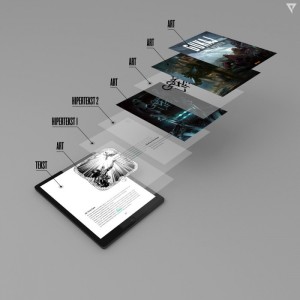
The Old Axolotl is a story about the end of biological life when humans devoid of bodies survive in a form of software. To go in line with the literary creation, the novel has no traditional paper release, as it came out exclusively in electronic formats that one can read on smartphones, tablets, e-readers, and computers.
With all illustrations and graphic elements, the readers can easily immerse into the new world presented in the novel. The hypertext in turn shows deeper layers of this literary creation. In the text there are plenty of hyperlinks which allow the readers to learn more about a given word, phenomenon, name, relations between the protagonists, historical and political background of various events. An element which completes the narrative are illustrations designed to be viewed on a smartphone or tablet screen. The available designs and diagrams for 3D printers add a new dimension to a book as boundaries between fiction and reality disappear – each reader can create one of the book characters using 3D printer and have it at home.
All these elements introduce the readers to the world invented by the author – a post-apocalyptic vision of the world without humans as we know them and the dawn of new civilization with a new form of men.
Only few people manage to save digitalized versions of their minds. Thanks to that, the survivors drowning in nostalgia create the new civilization.
The newest novel written by Dubiel, thought to be the second best Polish sci-fi writer after Stanisław Lem, raises philosophical questions of the nature and limits of men, loneliness, spirituality, and politics. It is a vision of the world which was destroyed and then recreated in a new form.
Another important elements of the book are multimedia and illustrations. Platige Image studio produced a promo spot directed by Maciej Jackiewicz. The studio has already worked with Dukaj as they produced a short animated film inspired by one of his short stories; the film was a nominee for the Academy Award. Inside the book, the reader may also find illustrations by Marcin Panasiuk, bookplates as well as logotypes of guilds and alliances created by Dukaj. Moreover, the book contains designs and diagrams of the robots which can be printed on a 3D printer. The designs and diagrams created by Alex Jaeger, who was also responsible for creating characters for films like Avengers and Transformers, are an integral part of the e-book.
As it was said before, The Old Axolotl was published by Allegro, a Polish online auction website. The project was carried out with support from Wydawnictwo Literackie (a printing house which has been publishing Dukaj’s novels for 13 years), bloggers, entrepreneurs, and various persons engaged in the development of e-book market. The premiere of The Old Axolotl will be accompanied by reissuing of mini e-books with 21 short stories and mini novels written by Dukaj. They will also be available at Allegro website.
The promo spot:
*******************************************************************************************
A GREAT PRESENTATION OF POLISH LITERATURE IN PARIS
This is the greatest presentation of Polish literature abroad in 15 years. In the period from 19th to 23rd March Wrocław and Kraków will be special guests at Salon du livre de Paris ‒ one of the biggest book fairs in Europe.
Among the authors presented by Kraków and Wrocław one may find: Lidia Amejko, Joanna Bator, Marek Bieńczyk, Iwona Chmielewska, Norman Davies, Artur Domosławski, Ludwik Flaszen, Urszula Kozioł, Marek Krajewski, Ryszard Krynicki, Ewa Lipska, Zygmunt Miłoszewski, Joanna Olech, Roman Polański, Grzegorz Rosiński, Tomasz Różycki, Marzena Sowa, Mariusz Szczygieł, Wojciech Tochman, Olga Tokarczuk, Agata Tuszyńska, and Krzysztof Varga.
Ireneusz Grin who prepares the literature program of the European Capital of Culture 2016 in Wroclaw gave us some details on the Polish exhibition.
Mirosław Spychalski: Wrocław and Kraków are the invited cities of the 2015 Book Fair in Paris. How it have happened? Active lobbing?
Ireneusz Grin: The Book Fair in Paris are organized since 1981; few years ago it was decided that the formula of the Fair would change and, apart from the guest of honour, i.e. an individual country, cities are invited to be special guests of the Fair. So far, these were Buenos Aires, Barcelona, Moscow, and Shanghai. The invitation for Wrocław and Kraków surprised us but soon we realised that lately both cities are talked about in the world of literature a lot. It especially applies to Wrocław which is the European Capital of Culture 2016 and World Book Capital City 2016. If we want the 2016 events to have a truly international character, 2015 is a perfect year to actively promote both the prepared program and the city itself as it creates its image and develops itself also through literature. We accepted the invitation after a long reflection being glad that Wrocław’s efforts for literature were acknowledged by such an important for literature city like Paris.
What does this distinction mean to the invited cities and Polish literature?
I.G. First of all, two Polish leaders in the field of literature will have an opportunity to present their uniqueness and, thanks to support of the Ministry of Culture and National Heritage as well as the Book Institute, represent the most important modern phenomena of Polish literature. Since the book fair in Frankfurt in 2006 we have not had a chance to present all that is important for Polish literature to such a great audience. I have already said several times that I take both titles literally. The Book Fair in Paris is the beginning of Wrocław’s being the capital of literature. I am really glad that it was acknowledged abroad. Things are not so easy in Wrocław even though a quite large group of malcontents will benefit from the carried out activities, also financially speaking.
Do you plan to exhibit literature awards given in Wrocław and Kraków, i.e. Angelus, Silesius, Wisława Szymborska Award, or festivals organised in these two cities?
I.G. Naturally. One part of the exhibition is telling about the cities and presenting various aspects of literature. Apart from presenting the awards and festivals, authors rewarded in both cities, persons engaged in literature as well as journalists connected with the artistic life of Wrocław and Kraków will attend the Fair.
How your exhibition is going to look like, apart from meetings with the authors?
I.G. Actually, the meetings with the authors will not dominate in the program. Most meetings will be open discussions held at our stand as well in various open themed areas and the industry areas. Each of them will focus on an individual subject which touches on Polish literature or critical issues affecting the humanities in the context of Europe; we want the meetings to have a universal character so that the audience at the Fair, mainly French, finds them familiar. That is why in our program one may find a discussion on film adaptations led by Roman Polański, Grzegorz Rosiński’s trial to answer the question if Thorgal is Polish, discussions on the freedom of the media or history of Central Europe attended by Norman Davies, meeting of Olga Tokarczuk and Erik Emmanuel Schmitt, a debate on literary genres attended by, among others, Marek Krajewski and Zygmunt Miłoszewski, a debate on absent Europe attended by Jurij Andruchowycz, debates on children literature, poetry, reportages, translation, libraries, booksellers, publishers. A lot to mention. We are speaking about several dozen discussions, meetings, and presentations which will take place during three days, most of them at the same time. We invited over forty authors and special guests from Poland and Europe. As the organiser of the Fair said, the program we prepared was a clear proof that it had been a brilliant idea to invite Polish cities.
Do you plan to attend other great book fairs, for example in Frankfurt, in such an unusual way?
IG. The choice where Polish literature is presented is influenced by how important the fairs are for the industry, how many people attend them, the way the Polish literature is perceived by the readers in a given country, what we want to achieve, and of course, our financial capacity. For sure, we will exhibit in Leipzig, Madrid, London, Frankfurt, and Lviv. And even in Warsaw.
Thank you.
Fot. www.wroclaw2016.pl
